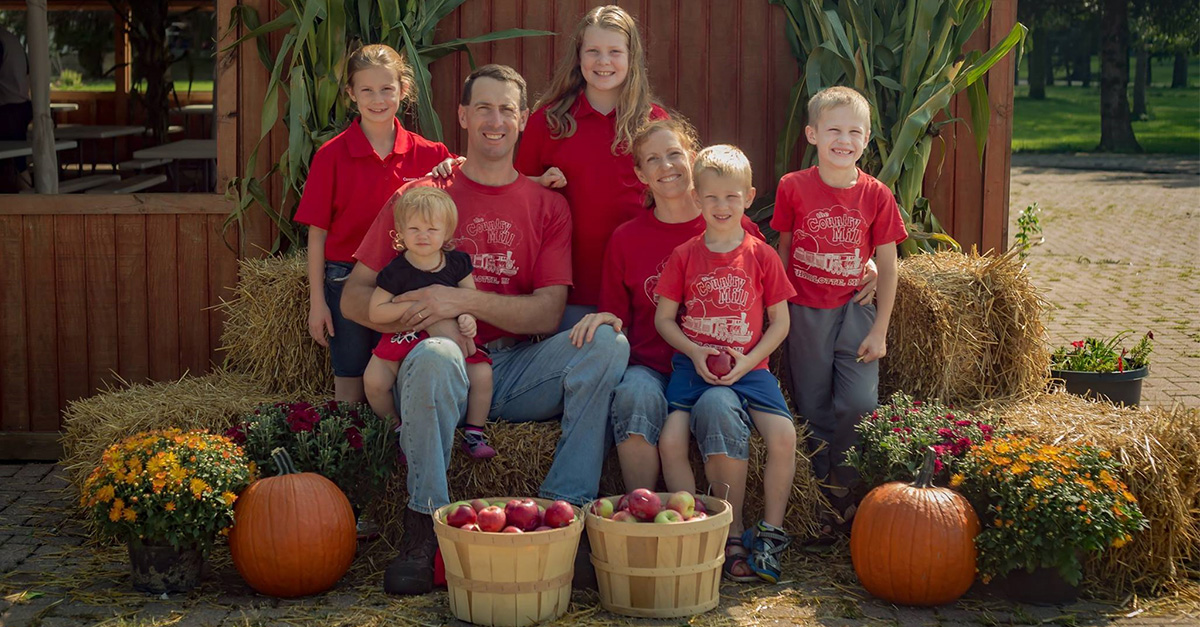


Get a free copy of Parental Rights & Education when you subscribe to our newsletter!

“Plaintiffs were forced to choose between following their religious beliefs and a government benefit for which they were otherwise qualified.”
–JUDGE PAUL L. MALONEY
A federal district court has ruled in favor of a Michigan farmer who was banned from selling his produce at a local farmer’s market because he had posted his Catholic beliefs on traditional marriage on Facebook and will not host same-sex weddings at his orchard.
Country Mill Farms in Charlotte, Michigan, is a second-generation family business that is known for hosting numerous charitable community events and growing fresh produce such as apples, blueberries, peaches, cherries, sweet corn, and pumpkins. The farm has had a notable presence at East Lansing Farmer’s Market for several years, even earning the title “invitational vendor” from 2011 to 2016 because of its extraordinary service.
However, a single Facebook post in 2016 stripped away the farm’s reputable attendance at the market when its owner, Steve Tennes, stated that he adheres to the Catholic Church’s teachings on marriage, including opposition to same-sex weddings at his family’s orchard.
When word about the post got out, the city of East Lansing instructed Country Mill Farms not to attend the farmer’s market because of possible protests. Tennes and his business attended anyway with no sign of protests that week and for the rest of the market season.
In response to the farm’s continued attendance, the city created a policy to officially exclude Country Mill Farms from the East Lansing farmer’s market by citing the city’s ordinance against discrimination based on sexual orientation. Despite the fact that the Market Planning Committee had specifically sent an invitation to Country Mill Farms for the previous six years, the city barred them from future invites and demanded that any application for the market sent by Country Mill Farms be forwarded to the city. No other vendor had this same restriction.
Despite the ordinance, Country Mill Farms went ahead and applied, following the non-invitational process for reserving a booth at the market. The city immediately rejected the application and told Country Mill Farms that it would only reconsider if Tennes changed his expression of religious beliefs. In response, Tennes moved to sue the city of East Lansing with the legal assistance of Alliance Defending Freedom (ADF) and asked the federal court to issue an injunction to allow Country Mill Farms to again participate in the seasonal market.
The court first granted an injunction in 2017, allowing the farm to continue to participate in the farmer’s market.
Last week, U.S. District Court Judge Paul L. Maloney finally decided the case based on its merits, finding that East Lansing’s ordinance and actions placed an unconstitutional “burden on plaintiffs’ religious beliefs.” In so doing, he ruled that Steve Tennes and his farm are now free to participate in the East Lansing Farmers Market.
In the ruling, Maloney argued that Tennes and his farm “were forced to choose between following their religious beliefs and a government benefit for which they were otherwise qualified,” violating his First Amendment right to freely exercise his religion.
ADF Senior Counsel Kate Anderson, who argued before the court in July 2021, said,
“Steve and his family-run Country Mill Farms happily serve all customers as a valued vendor at East Lansing’s farmer’s market, and he’s grateful he can continue his longtime partnership with the city and its residents. The district court’s decision rightly protects Steve’s freedom to operate his business according to his convictions. Country Mill has continued to participate in the farmer’s market without issue during this litigation.”

Country Mills Farms v. City of East Lansing is another important win for religious liberty. It follows several other court rulings affirming that Christians have just as much right to practice their beliefs in the public square as any other American.
Among those recent wins is 303 Creative v. Elenis, in which the Supreme Court struck down a Colorado law that would’ve penalized Christian graphic designer Lorie Smith for refusing to design a website for a same-sex wedding because it violated her religious beliefs. Her case followed that of Jack Phillips, who has spent more than a decade fighting lawsuits brought by LGBTQ activists trying to force him to create cakes celebrating beliefs contrary to his faith. In light of the 303 Creative ruling, Phillips has asked the Colorado Supreme Court to throw out the case against him.
Over the last year, the Supreme Court has also ruled that:
In other positive judicial developments, several federal courts have ruled that universities and colleges cannot discriminate against religious clubs and students, but last year a U.S. District court took that concept a step further and ruled that universities that do discriminate in this manner can be held legally accountable.
Cases such as these show that when religious Americans find their religious liberty and free speech rights infringed upon by the government and take steps to challenge those actions, the courts are upholding the Constitution.
And that’s good news for Steve Tennes and other business owners, as the court’s decision in Country Mills Farms v. City of East Lansing builds on these other wins by affirming that Christians have just as much right as anyone else to operate a business in the public square — without being forced to compromise their convictions.
The Church must be involved in public discourse and influence. That’s why we write — so our readers can be equipped to understand and pursue righteous change in the world. For more timely, informative, and faith-based content, subscribe to the Standing for Freedom Center newsletter.
Christian conservative news and issues that matter. Curated just for you!
